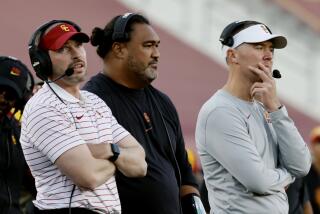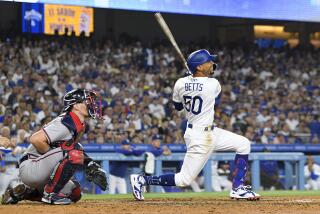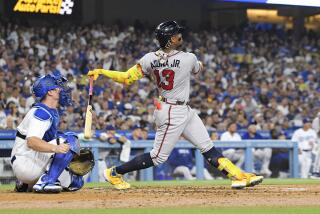Ted Turner’s Fonda Jane, Which Could Bode Well for Braves
WEST PALM BEACH, Fla. — In the position he occupies in American affairs, Ted Turner, you conclude unmistakably, does things in a major way.
He puts together the Turner Broadcasting System, which consists of three television enterprises, including one called “SuperStation,” a billing that befits the level at which Ted operates.
He buys MGM-United Artists, sells part, keeps part.
He originates, and bankrolls, the Goodwill Games, whose first venture in 1986 costs him $25 million. Ted shrugs. He comes back with a second Goodwill Games this summer.
A noted yachtsman, he wins the America’s Cup.
And, in a union of giants, he is now found in the company of Jane Fonda.
Actually--and no doubt for good reason--he sees Jane more than he does the Atlanta Braves, a Turner property tending, the last couple of years, to depress Ted.
The Braves keep finishing last, possibly explaining why people on the club saw him only once during the 1989 season.
Not many things have been happening to the Braves that Ted could call encouraging. They sign Bruce Sutter, a relief specialist, for millions, and what they get out of Bruce before his exit is close to nothing.
In a charitable frame of mind, they give Cleveland Brett Butler and Brook Jacoby for pitcher Len Barker, and Barker is soon in the pits, on his way to leaving the sport.
Deciding they need a healthy bat, they give two pitchers to the Cubs for Jody Davis, and Mr. Davis last year hits .169.
Searching for pitching help, they capture in a trade with Kansas City Charlie Leibrandt and, working out in preparation for the new season, Charlie tears a shoulder muscle.
Has anything else gone wrong for Ted? Well, the Braves give their center fielder, Dale Murphy, millions to remain in Atlanta and, the last two years, Dale hits .226 and .228.
One of society’s noblemen, a knight dedicated to good, Murphy is apologetic. He doesn’t blame the team that is built around him, claiming, as most batsmen would in his predicament, that the guy hitting ahead of him, and the one hitting behind him, aren’t dangerous enough to help Murphy.
Murphy blames Murphy.
The misery of the Braves serves as a tribute to the character of Fonda, who, developing a friendship with the owner of this troupe, proves she is no front-runner.
Now, on the playing fields of West Palm Beach, the Braves are making preparations for a season they promise faithfully will make Jane proud of them.
“I can’t help but believe,” says Manager Russ Nixon, “that we will be turning upward. We tried to go with young players and it didn’t work out. Now we have gone after some seasoned players and I think we’re going to be all right.”
Nixon has reference to catcher Ernie Whitt and infielders Jim Presley and Nick Esasky, starters bagged by the Braves during the winter.
If a town’s sophistication can be measured by its coolness to losing teams, Atlanta has arrived, making the Braves a study in avoidance.
Drawing but 985,000 at home last year, the Braves were the only club in the majors failing to hit a million.
But, whatever their crises in the standings, and records of .347 and .394 the last two years can be interpreted as crises, they parade as America’s Team, watched in 110 games, in 52 million homes in this land, over Turner’s celebrated SuperStation.
Routed from the family room by a wife watching “The Golden Girls,” a guy can repair to a niche in another part of the house and pick up a Braves game, in desperation if for no other reason.
Looking at the Braves may not be the consummate thrill, but it doesn’t cause disease.
If you study your big league standings of 1989, you find that only one other team won fewer games than Atlanta, which won 63.
Detroit won but 59, a dramatic downturn for a club once strongly in contention and, of course, winner of the world championship in 1984.
How such slippage can occur isn’t always easy to isolate, but, to rectify this fluke of nature, Detroit has gone out and hired Bo Schembechler as president, no doubt due to Bo’s experience.
Bo isn’t conversant with baseball but, obviously feeling there are hind quarters that need kicking, management has enlisted Bo on the strength of his skill kicking sideline markers.
Kicking is kicking, the Tigers feel. And no one could deliver a foot to a sideline marker as Bo could.
Since, for baseball’s cellar, Detroit is Atlanta’s principal rival, Ted Turner doesn’t figure to stand pat.
He may counter the Schembechler move by hiring as president of the Braves Lou Holtz.
Lou doesn’t kick sideline markers with the artistry of Bo but, the night before his game with USC in ‘88, Holtz gave the foot to two starting players for showing up late to dinner.
Notre Dame ate at 6. The players tried to explain that farmers dined at that hour. They wouldn’t think of making a reservation before 8.
The point they advanced is hard to refute. You call for a table and the maitre d’ informs you he can take you only at 6, or 9:30.
And the yokel accepts 6, instead of telling him to take his table and stick it in the cassoulet.
But Holtz came down hard on his tardy players, proving he is a prospect, indeed, to run a big league baseball club.
More to Read
Go beyond the scoreboard
Get the latest on L.A.'s teams in the daily Sports Report newsletter.
You may occasionally receive promotional content from the Los Angeles Times.









